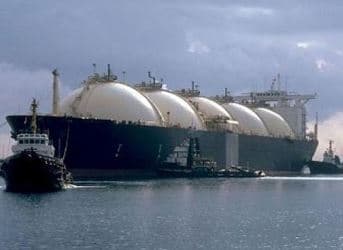The Department of Energy issued its conditional approval for a liquefied natural gas export terminal in Oregon on March 24. This marks the seventh overall LNG export terminal to receive the regulatory green light, and the first on the west coast. The Jordan Cove export terminal would be situated near Coos Bay Oregon, and would allow the export of 0.8 billion cubic feet of natural gas per day. It still needs other regulatory and environmental permits before it can be constructed. The Jordon Cove terminal would export a mix of Canadian and U.S. natural gas, and would be in a much better position to reach lucrative Asian markets than competing projects on the Gulf Coast.
Senator Ron Wyden (D-OR), who has been consistently cautious when it comes to LNG exports, praised the move. “This announcement is exactly what Coos Bay, North Bend and America need: new jobs and new investment, while factoring in a changed geopolitical landscape through a case-by-case process,” he said in a statement. “Priority one for me has always been ensuring American jobs and employers see the full benefits of the natural gas renaissance. The Department of Energy must monitor markets closely and be prepared to adjust course should any threat to American jobs or energy security emerge.” His support may be because the project is located in his home state, but it is still very notable. He has been a powerful voice arguing for a slow process that would allow LNG exports to hit a “sweet spot” – allow some exports without leading to higher natural gas prices for consumers.
Related Article: Gas Wars: Will US Export LNG to Europe?
The approval comes at a time of heightened pressure on the administration to accelerate permit approvals for LNG export terminals to undermine Russia’s geopolitical influence in Europe. Despite the fact that none will be built in the near future, industry groups supporting freer exports and their allies in Congress are using the brewing Ukrainian crisis to justify a swift liberalization of LNG trade.
On March 25, energy committees in both the House and the Senate held hearings on LNG exports. The House Energy Committee analyzed legislation that would allow LNG exports without the need for government approval to any country that is part of the World Trade Organization. That measure would essentially eliminate DOE’s authority over the issue, as the WTO has 159 member countries, including all of which that could realistically import LNG.
On the Senate side, the Energy and Natural Resources Committee held a hearing with Lithuania’s Energy Minister Jaroslav Neverovic, a country that has expressed interest in greater American LNG. “Accelerating America’s entry into the global natural gas market is a win-win-win situation,” Neverovic said in his prepared testimony. “America wins through job creation, economic growth and more revenues for government. Customers across Europe win by access to more competitive, clean-burning U.S. natural gas. And strategic cooperation of NATO allies would be strengthened.”
Related Article: Opportunity for U.S. LNG Exporters May Be Limited
The hearing was also the first one in which Senator Mary Landrieu (D-LA) presided over as Chair. She is a major proponent of the oil and gas industry, and has picked up the mantle of pushing for greater LNG and crude oil exports. With her and Ranking Member Lisa Murkowski (R-AK) working in unison on the issue, coupled with what appears to be Sen. Wyden’s acquiescence (at least based on his praise for the latest permit approval), the issue of LNG exports is gaining significant traction. Before the crisis in Ukraine broke out several weeks ago, it was unclear which side would prevail on the issue. Now, it appears to be a foregone conclusion that the U.S. will allow companies to move forward with exports. The bigger question is whether or not it will be profitable to do so.
Yet, the issue is still the warm-up round for what will be a much bigger fight – over whether or not to allow crude oil exports. That will be a much tougher battle to wage for export supporters, but they are certainly making headway.
ADVERTISEMENT
By Nicholas Cunningham of Oilprice.com


















